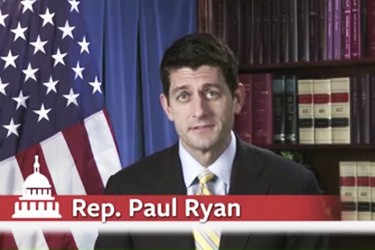Paul Ryan: Pro His Family, Not-So-Pro Other People’s

What did the United States achieve with welfare reform?
Its core objective — getting the poor into jobs — was laudable. In the early years, the effects seemed almost too good to believe. The number of families on welfare plummeted. The labor supply of single mothers soared. Child poverty declined sharply.
But the cheering faded. Over time the labor supply of less-educated single mothers, those with at most a high school education, returned to its earlier level. Poverty rebounded, as did births outside marriage.
After the fact, many independent researchers concluded that the strong economy of the late 1990s, combined with bigger wage subsidies through an expanded earned-income tax credit, deserved most of the credit for the improvement. Meanwhile, pushing the poor off welfare — replacing the entitlement to cash assistance with limited state-run programs that sharply curtailed access to aid for all sorts of reasons — had definite costs, borne by the poorest of the poor.
… so let’s do it again! Or so suggests Wisconsin Rep Paul Ryan.
Under the banner of “flexibility for accountability,” Ryan presents an agenda that reflects “deregulation for deprivation,” systematically reducing public assistance in hopes of “incentivizing” people to be somehow less poor. New research shows us that the plan would deepen the damage already inflicted by eighteen years of reforming welfare out of existence.
The centerpiece of Ryan’s latest budget plan is the so-called “opportunity grant,” which consolidates eleven federal programs into a single chunk of funding, including food stamps, subsidized childcare, and housing funds. This ultimately forces welfare admnistrations to parcel out money for, say, rehabilitation programs for people with disabilities, senior centers and subsidized daycare for toddlers, all from the same capped fiscal pot, which in turn dilutes overall funding streams and undercuts resources for directly assisting the poor.
Progressive critics say that this formula has been tried before, with the 1996 welfare reform law that gutted key public assistance programs. Those measures capped benefits and lumped programs into a single pot of funding, with disastrous effects
Ryan, as you may know, is the Wisconsin family man and ex-Vice Presidential contender who is going to be your next Speaker of the House. Oh, and Sheryl Sandberg likes him. She just gave him a “Lean In” award via Facebook for saying that he wouldn’t become Speaker unless he could continue to spend quality time with his three children.
The post received over 30,000 likes — even more than Sandberg’s recent post praising actress Jennifer Lawrence for speaking out about how ridiculous it is that female actors are paid less in Hollywood.
But it also got over 1,500 comments, many of which questioned how Sandberg could say Ryan was a champion of American families when he is against requiring employers to provide paid leave for parents.
Sandberg wasn’t the only one to give Ryan a thumbs up for taking a brave stance on the importance of family. Arianna Huffington and Ezra Klein applauded too.
Cosmo’s take is more thoughtful:
Ryan is asking for less time on the road and less of a focus on fundraising, conditions that accompany a promise that a faction of the GOP can’t oust him with a motion to vacate the chair should they decide down the road that they just aren’t that into him.
Spending time with his family has long been Ryan’s claim for why he never got into a leadership position within the party in the first place. Even back in 2010, he called himself a “homebody,” telling Time magazine, “Half the reason I’m not in leadership is because I don’t want to spend my weekends flying around the country campaigning and raising money. I want to spend my weekends at home with my little ones.” …
Ryan’s very public demand for a meaningful balance between his work and family life as a prerequisite for the speakership is laudable, especially since it has been downplayed so often and compartmentalized as just being a “women’s issue.” But it’s also one that very few people of either gender will get to make because, unlike most people negotiating for a job, he has absolutely nothing to lose. As the only acceptable candidate for a position he has made it clear he is not seeking out, Ryan can ask for the moon. But if he is denied, Ryan is unlikely to be hurt in the process. Instead, those who support women in leadership positions will feel the damage. After all, if Ryan’s refusal is wrapped in the guise of being too busy for a promotion because he has children at home he’d like to spend a little more time with, what precedent does that set for the next time a mother is being considered for a high-level, 24/7 position?
Others like Bernie Sanders, Elizabeth Warren, and, perhaps most charmingly, EGR at Jezebel, call Ryan a hypocrite for insisting on his own ability to take care of his family while opposing legislation that would allow other families across the country the same freedom.
To me, though, his Take 2 welfare reform efforts are more revealingly anti-family than any party line stance he takes on laws related to leave. Like, of course he objects to progressive legislation backed by his political opponents. But does he have to double down on two decades of punitive cruelty, especially when that cruelty hasn’t even been shown to have the intended effect?
Especially since we have learned since the 90’s that simply giving cash to those who need it can make a huge, positive difference.
Support The Billfold
The Billfold continues to exist thanks to support from our readers. Help us continue to do our work by making a monthly pledge on Patreon or a one-time-only contribution through PayPal.
Comments